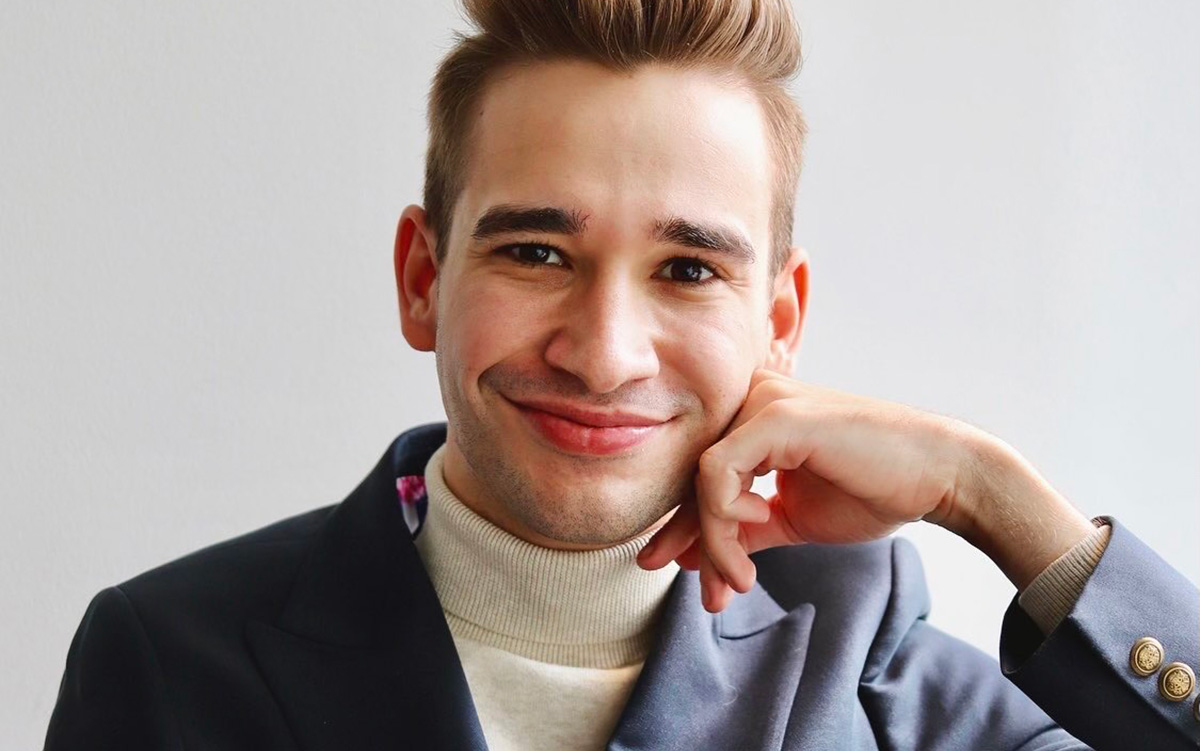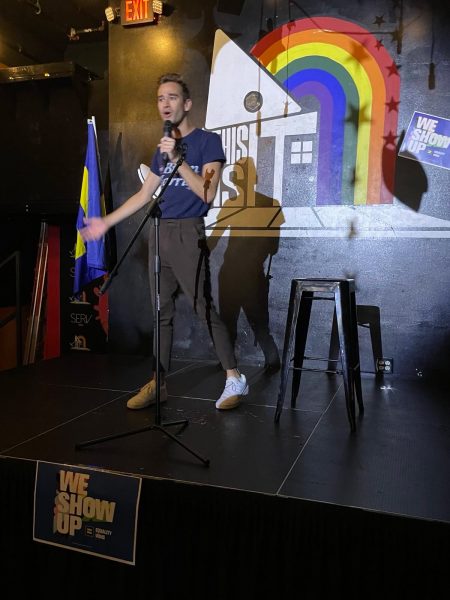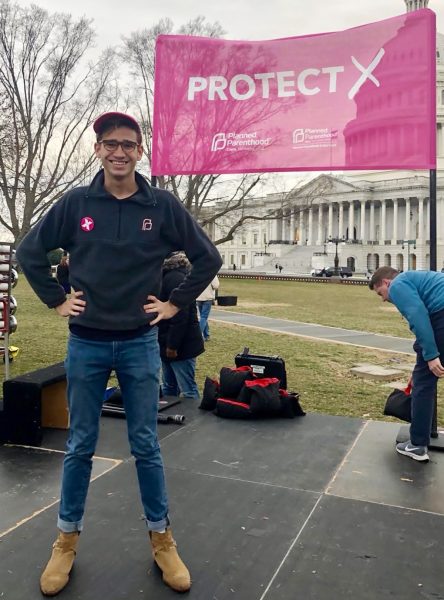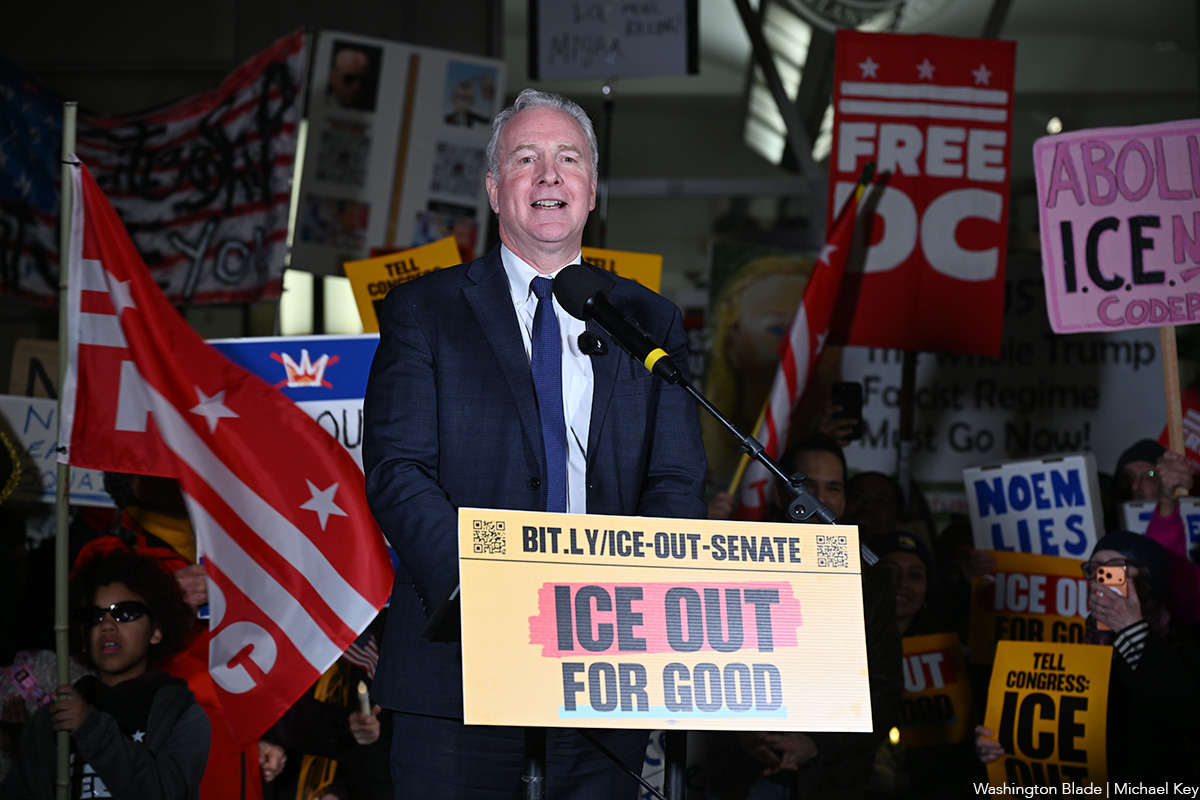Politics
Harris campaign’s LGBTQ+ engagement director on winning in November
Sam Alleman shares details of his personal and professional journey

Sam Alleman, national LGBTQ+ engagement director for the Harris-Walz 2024 campaign, talked with the Washington Blade last week for an exclusive interview about his work building and strengthening coalitions within the community in hopes of winning in November.
On the Democratic side, organizing LGBTQ voters for a presidential campaign goes back at least a decade, he said, to 2012 when Jamie Citron — currently the deputy assistant to the president and principal deputy director of the White House Office of Public Engagement — helped to lead these efforts on behalf of then-President Barack Obama’s reelection bid.
On Hillary Clinton’s campaign, Alleman said, it was Dominic Lowell working in close coordination with Sean Meloy, director of LGBT engagement for the Democratic National Committee, who now serves as vice president of political programs at the LGBTQ Victory Fund and Institute.
“Something that we’re very proud of as the little crew of folks who all are friends,” Alleman said, “is really building off each other’s work to continue scaling this and building out infrastructure to organize within the community.”
He added that in 2020, Reggie Greer, who led LGBTQ engagement for the Biden-Harris campaign and is now the State Department’s senior adviser to the U.S. Special Envoy to Advance the Human Rights of LGBTQI+ Persons, “was dealt the very difficult hand of a global pandemic.”
He explained, despite the challenges, Greer and others managed to build “a wonderful program that’s very much virtual, put forward from folks that did this work and were online,” which has shaped efforts through to this day as the Harris-Walz campaign seeks to “really get people back in person” as they focus their push in, especially, the seven battleground states.
The goal, Alleman said, is “not losing the virtual component, but complementing it” to “get people back on board, back to the event, back to the rally, back to the business that is a presidential campaign in 2024.”
“That’s a question and a piece of this work that is not necessarily unique to the LGBTQ+ portfolio,” he said. “But then it’s been something that we’ve worked through, and I think getting that from 2020 and rebuilding and fleshing that out has been a top priority.”
“We have wonderful working relationships with Liam Kahn over at the DNC right now,” Alleman said, referring to the committee’s director of LGBTQ+ coalitions, “and then, of course, my counterpart in finance, James Conlon, we work hand in glove as a team to execute on all of this work,” together with “my deputy, oh my gosh, he just started, I’m so excited, Cesar Toledo — who is like an absolute force and really runs the day to day of the organizing program.”

For his part, Alleman’s career has taken him from organizing work as a college student for then-Texas State Sen. Wendy Davis to campaign work for Clinton to the center of the reproductive rights movement at Planned Parenthood to the White House and, now, the Harris-Walz 2024 race.
“I started on the campaign in April of 2024,” he said, working on behalf of what was then the Biden-Harris ticket, while before that, “I was at the DNC for two and a half years. So I started over there as the LGBTQ coalitions director in October of 2021 and helped to manage all their LGBTQ+ programming through the midterm elections.”
Alleman continued, “I was also the regional coalitions director for the Midwest. We affectionately called it the “snow belt,” but [it was] our Great Lakes and Northeast states of Wisconsin, Michigan, Pennsylvania, and New Hampshire in 2022 as well, working in that pod in tandem with all of our state programming.”
When transitioning into the new role, Alleman said “it was keenly important” for him to facilitate the continued investment in building “infrastructure for our community at the DNC” which is something the organization has shown is a priority focus.
“At the DNC, the work is very infrastructure focused,” he said, through the vehicle of coordinating with “our state parties” and “making sure that they have the resources to do this work to mobilize voters.”
Alleman added that a few dozen state Democratic parties have LGBTQ caucuses, so at the DNC he was working to “make sure that they were getting organized” in coordination “of course, with the partners, too.”
Asked to compare his experiences working in similar roles for the committee and then the presidential campaign, Alleman said “The party has a bigger responsibility, I should say, to think about the totality of the ticket” which means considering questions like “how are we getting resources to [down-ballot] races, like city council members and state reps and state senators?”
He noted “there are a lot of LGBTQ state reps and state senators with big names [who are doing] amazing work in this moment.”
By contrast, “when we’re here on the presidential [ticket] it’s a lot of the same strategies and tactics, but really homed in on our battleground states, really homed in on [the question of] ‘how are we building out capacity to talk to those voters where we know our pathway to victory is?'”
In between the Clinton campaign and the DNC was a long stint at Planned Parenthood, Alleman said, an opportunity that found him via a friend who reached out after Trump’s victory in 2016.
Packed into the Javits Center, where the Clinton team had organized what they — and most Americans — expected to be a victory party, Alleman said “everything changed from that point on” as “things that had felt so certain and so set in terms of what I was planning on doing, just sort of all changed.”
“I feel like it was that way for so many of us, both in terms of work, our personal lives, everything that happened in 2016,” he said. “And so I got a call from a friend — a good friend of mine who’s still one of my best friends, actually, I just officiated her wedding.”
The personal is political

“Everything really just sort of clicked there,” Alleman said, adding, “I worked at Planned Parenthood for five or six years, doing various jobs,” starting with the Metropolitan Washington affiliate where he worked to “plan the logistics and busses for the Women’s March” in 2017 to protest Donald Trump’s election.
Reproductive rights, he said, is “a big part of my story and why I’m in the work.”
Alleman is a Texas native. In college, he worked for the campaign of then-state senator Wendy Davis, who famously held a 13-hour-long filibuster in 2013 to block legislation that would have imposed harsher abortion restrictions.
“I’m originally from Plano,” he said. “By virtue of being from Texas, these things that feel like very big issues now have sort of always been litigated, LGBTQ+ rights, reproductive rights, in our state based off just conservative extremists,” adding, “we would call them MAGA Republicans now.”
While he was always supportive of reproductive rights, Alleman said that as a young man who was grappling with his sexuality and on his own coming out journey, he did not fully understand “the totality” of those freedoms and how they intersect with other core American values.
“A very important part of my story, and a big part of why I do this work, is my sister,” Alleman said. Just seven months after getting health insurance coverage through the Affordable Care Act, he said his sister was “diagnosed with breast cancer at a Planned Parenthood health center via a breast exam.”
While she “is now cancer free and in remission and doing very well,” Alleman said, “I don’t know what my family would have done if we had not been able to access health insurance through the Affordable Care Act.”
“It would have bankrupted my family,” he said, “and I would have dropped out of college. I wouldn’t be sitting here today, right? Like, nothing that happened would have happened, would have been possible. She very well may not be alive, you know?”
Alleman continued, “And so, the importance of healthcare and access to affordable healthcare, and then the ability for us to have bodily autonomy and then control of our own decisions and destinies, has always just been something that has been critically important for me.”
“We talk about all the accomplishments that we’ve seen from the Biden-Harris administration,” he said, like “the Affordable Care Act and what that means, but my story is an example of the impact of that, [of] what this actually means for people to have access to health care and health insurance, what this actually means for people to be able to go to their Planned Parenthood health center and feel safe in accessing reproductive health care in its totality, from abortion to breast exams.”
He described falling “in love” with the work at Planned Parenthood as well as with the movement for reproductive freedom. “I moved up to the national office about six or seven months after starting at the affiliate on their political team,” he said, “and ended as their national political manager before moving over to the DNC.”
From there, Alleman said, “I worked at the DNC for two and a half years managing the LGBTQ coalition work” during which time “we were really proud of the Biden-Harris administration, but it always felt [like] it was so clear where we would probably be in terms of who we were running against, right, where we are today in 2024.”
So the focus remained, he said, on “what was at stake, not only in the work that we needed to get done politically to, you know, get infrastructure done, get the Inflation Reduction Act done, make sure that we help the Senate and House as best we could in the midterms, so that we can continue achieving things like the Respect for Marriage Act — but as well, to put us in as best a position as possible to take on what was the looming threat to our democracy, and what is the looming threat to our democracy, that is Donald Trump.”
Alleman added, “And we see now” from “Project 2025” what “things will look like should he win — though we have, I think, a pretty good plan to keep that from happening.”
Storytelling and organizing go hand-in-hand
“I consider myself first and foremost an organizer, and there’s nothing more powerful for an individual than knowing your story and being able to tell that and stand in its truth and what that means for you and your power,” Alleman said.
He sees this as an important part of not just his work and career but also a focus of the campaign.
“So storytelling is absolutely, to me, one of the most fundamental things we do as organizers — it’s helping people find their voice and how they want to use that to benefit their communities, to turn out voters, and really just participate in our democracy,” he said.
Storytelling is also an important element of communicating about our intersectional identities, Alleman said. “We talk about these communities sometimes in such different lanes, but in reality, we’re all creatures of narrative.”
He added, “We’re all sort of experiencing life in that more qualitative, narrative way. And those stories are where people not only are able to sort of synthesize all the things that they are, but also provide the actual emotion and the human aspect of these issues in life.”
Congress
Van Hollen speaks at ‘ICE Out for Good’ protest in D.C.
ICE agent killed Renee Nicole Good in Minneapolis on Jan. 7

U.S. Sen. Chris Van Hollen (D-Md.) is among those who spoke at an “ICE Out for Good” protest that took place outside U.S. Customs and Border Protection’s headquarters in D.C. on Tuesday.
The protest took place six days after a U.S. Immigration and Customs Enforcement agent shot and killed Renee Nicole Good, a 37-year-old woman in Minneapolis.
Good left behind her wife and three children.
(Video by Michael K. Lavers)
Congress
Advocates say MTG bill threatens trans youth, families, and doctors
The “Protect Children’s Innocence” Act passed in the House

Georgia Congresswoman Marjorie Taylor Greene has a long history of targeting the transgender community as part of her political agenda. Now, after announcing her resignation from the U.S. House of Representatives, attempting to take away trans rights may be the last thing she does in her official capacity.
The proposed legislation, dubbed “Protect Children’s Innocence Act” is among the most extreme anti-trans measures to move through Congress. It would put doctors in jail for up to 10 years if they provide gender-affirming care to minors — including prescribing hormone replacement therapy to adolescents or puberty blockers to younger children. The bill also aims to halt gender-affirming surgeries for minors, though those procedures are rare.
Greene herself described the bill on X, saying if passed, “it would make it a Class C felony to trans a child under 18.”
According to KFF, a nonpartisan source for health policy research, polling, and journalism, 27 states have enacted policies limiting youth access to gender-affirming care. Roughly half of all trans youth ages 13–17 live in a state with such restrictions, and 24 states impose professional or legal penalties on health care practitioners who provide that care.
Greene has repeatedly introduced the bill since 2021, the year she entered Congress, but it failed to advance. Now, in exchange for her support for the National Defense Authorization Act, the legislation reached the House floor for the first time.
According to the 19th, U.S. Rep. Sarah McBride (D-Del.), the first trans member of Congress, rebuked Republicans on the Capitol steps Wednesday for advancing anti-trans legislation while allowing Affordable Care Act tax credits to expire — a move expected to raise health care costs for millions of Americans.
“They would rather have us focus in and debate a misunderstood and vulnerable one percent of the population, instead of focusing in on the fact that they are raiding everyone’s health care,” McBride said. “They are obsessed with trans people … they are consumed with this.”
Polling suggests the public largely opposes criminalizing gender-affirming care.
A recent survey by the Human Rights Campaign and Global Strategy Group found that 73 percent of voters in U.S. House battleground districts oppose laws that would jail doctors or parents for providing transition-related care. Additionally, 77 percent oppose forcing trans people off medically recommended medication. Nearly seven in 10 Americans said politicians are not informed enough to make decisions about medical care for trans youth.
The bill passed the House and now heads to the U.S. Senate for further consideration.
According to reporting by Erin Reed of Erin In The Morning, three Democrats — U.S. Reps. Henry Cuellar and Vicente Gonzalez of Texas and Don Davis of North Carolina — crossed party lines to vote in favor of the felony ban, joining 213 Republicans. A total of 207 Democrats voted against the bill, while three lawmakers from both parties abstained.
Advocates and lawmakers warned the bill is dangerous and unprecedented during a multi-organizational press call Tuesday. Leaders from the Human Rights Campaign and the Trevor Project joined U.S. Rep. Becca Balint (D-Vt.), Dr. Kenneth Haller, and parents of trans youth to discuss the potential impact of restrictive policies like Greene’s — particularly in contrast to President Donald Trump’s leniency toward certain criminals, with more than 1,500 pardons issued this year.
“Our MAGA GOP government has pardoned drug traffickers. They’ve pardoned people who tried to overthrow the government on January 6, but now they want to put pediatricians and parents into a jail cell for caring for their kids,” said Human Rights Campaign President Kelley Robinson. “No one asked for Marjorie Taylor Greene or Dan Crenshaw or any politician to be in their doctor’s office, and they should mind their own business.”
Balint, co-chair of the Congressional Equality Caucus, questioned why medical decisions are being made by lawmakers with no clinical expertise.
“Parents and doctors already have to worry about state laws banning care for their kids, and this bill would introduce the risk of federal criminal prosecution,” Balint said. “We’re talking about jail time. We’re talking about locking people up for basic medical care, care that is evidence-based, age-appropriate and life-saving.”
“These are decisions that should be made by doctors and parents and those kids that need this gender-affirming care, not certainly by Marjorie Taylor Greene.”
Haller, an emeritus professor of pediatrics at St. Louis University School of Medicine, described the legislation as rooted in ideology rather than medicine.
“It is not science, it is just blind ideology,” Haller said.
“The doctor tells you that as parents, as well as the doctor themselves, could be convicted of a felony and be sentenced up to 10 years in prison just for pursuing a course of action that will give your child their only chance for a happy and healthy future,” he added. “It is not in the state’s best interests, and certainly not in the interests of us, the citizens of this country, to interfere with medical decisions that people make about their own bodies and their own lives.”
Haller’s sentiment is echoed by doctors across the country.
The American Medical Association, the nation’s largest organization that represents doctors across the country in various parts of medicine has a longstanding support for gender-affirming care.
“The AMA supports public and private health insurance coverage for treatment of gender dysphoria and opposes the denial of health insurance based on sexual orientation or gender identity,” their website reads.
Rodrigo Heng-Lehtinen, senior vice president of public engagement campaigns at the Trevor Project, agreed.
“In Marjorie Taylor Greene’s bill [it] even goes so far as to criminalize and throw a parent in jail for this,” Heng-Lehtinen said. “Medical decisions should be between patients, families, and their doctors.”
Rachel Gonzalez, a parent of a transgender teen and LGBTQ advocate, said the bill would harm families trying to act in their children’s best interests.
“No politician should be in any doctor’s office or in our living room making private health care decisions — especially not Marjorie Taylor Greene,” Gonzalez said. “My daughter and no trans youth should ever be used as a political pawn.”
Other LGBTQ rights activists also condemned the legislation.
Tyler Hack, executive director of the Christopher Street Project, called the bill “an abominable attack on the transgender community.”
“Marjorie Taylor Greene’s last-ditch effort to bring her 3-times failed bill to a vote is an abominable attack on the transgender community and further cements a Congressional career defined by hate and bigotry,” they said. “We are counting down the days until she’s off Capitol Hill — but as the bill goes to the floor this week, our leaders must stand up one last time to her BS and protect the safety of queer kids and medical providers. Full stop.”
Hack added that “healthcare is a right, not a privilege” in the U.S., and this attack on trans healthcare is an attack on queer rights altogether.
“Marjorie Taylor Greene has no place in deciding what care is necessary,” Hack added. “This is another attempt to legislate trans and queer people out of existence while peddling an agenda rooted in pseudoscience and extremism.”
U.S. Rep. Mark Takano (D-Calif.), chair of the Congressional Equality Caucus, also denounced the legislation.
“This bill is the most extreme anti-transgender legislation to ever pass through the House of Representatives and a direct attack on the rights of parents to work with their children and their doctors to provide them with the medical care they need,” Takano said. “This bill is beyond cruel and its passage will forever be a stain on the institution of the United States Congress.”
The bill is unlikely to advance in the Senate, where it would need 60 votes to pass.
Politics
LGBTQ Democrats say they’re ready to fight to win in 2026
DNC winter meetings took place last weekend in Los Angeles

The Democratic National Committee held its annual winter meetings in Downtown Los Angeles over the weekend, and queer Democrats showed up with a clear message for the national organization: don’t abandon queer and transgender people.
Following last year’s disastrous presidential and congressional elections, many influential pundits and some powerful lawmakers called on Democrats to distance the party from unpopular positions on trans rights, in order to win swing districts by wooing more conservative voters.
But members of the DNC’s LGBTQ Caucus say that’s actually a losing strategy.
“There are still parts of our party saying we need to abandon trans people in order to win elections, which is just not provable, actually. It’s just some feelings from some old consultants in DC,” LGBTQ Caucus Chair Sean Meloy says.
Some national Democrats are already backtracking from suggestions that they walk back on trans rights.
California Gov. Gavin Newsom grabbed national attention in March when he suggested that it was “deeply unfair” for trans girls to play in women’s sports. But last week, he doubled down on support for trans rights, claiming to have signed more trans-rights legislation than any governor in the country, and entering into feuds on X with Elon Musk and Nicki Minaj over his support for trans kids.
Democrats are also clearly feeling the wind in their sails recently after major election victories in Virginia and New Jersey last month, as well as victories in dozens of local and state legislative elections across the country in 2025.
“[Abigail] Spanberger in Virginia didn’t win by dodging the trans question. She won by attacking it, confronting it, and that’s how she got ahead,” says Vivian Smotherman, a trans activist and at-large member of the DNC’s LGBTQ Caucus.
“Trans people are not a problem. We are a resource,” Smotherman says. “For my community, surviving into adulthood is not a guarantee, it’s an accomplishment. You don’t walk through a survival gauntlet without learning things … I’m not begging the DNC to protect my community. I’m here to remind you that we are the warriors tempered by fire, and we are fully capable of helping this party win.”
At its own meeting on Friday, the LGBTQ Caucus announced several new initiatives to ensure that queer and trans issues stay top of mind for the DNC as it gears up for the midterm elections next year.
One plan is to formalize the DNC’s Trans Advisory Board as distinct from the LGBTQ Caucus, to help introduce candidates across the country to trans people and trans issues.
“One in three people in this country know a trans person. Two-thirds of Americans don’t think they do,” Smotherman says. “So the real problem is not being trans, it’s that you don’t know us. You cannot authentically support a trans person if you’ve never met one.
“That’s why my first goal with this Trans Advisory Board is to host a monthly Meet a Trans Person webinar. Not as a spectacle, as a debate, but as a human connection, and I will be charging every state chair with asking every one of their candidates up and down the board if they know a trans person. And if that person doesn’t know a trans person, I’m gonna have that state chair put them on that webinar.”
The LGBTQ caucus is also opening up associate membership to allies who do not identify as LGBTQ, in order to broaden support and connections over queer issues.
It’s also preparing for the inevitable attacks Republicans will throw at queer candidates and supporters of LGBTQ issues.
“These attacks are going to come. You have to budget money proactively. You have to be ready to fight,” Meloy says. “There are some local party chairs who don’t want to recruit LGBTQ candidates to run because these issues might come up, right? That’s an absolutely ludicrous statement, but there are still people who need support in how to be ready and how to respond to these things that inevitably come.”
“The oldest joke is that Democrats don’t have a spine. And when they come after us, and we do not reply, we play right into that.”
Meloy also alluded to anti-LGBTQ tropes that queer people are out to harm children, and said that Democrats should be prepared to make the case that it’s actually Republicans who are protecting child abusers – for example, by suppressing the Epstein files.
“They are weak on this issue. Take the fight, empower your parties to say, ‘These people have nothing to stand on,’” Meloy says.



















